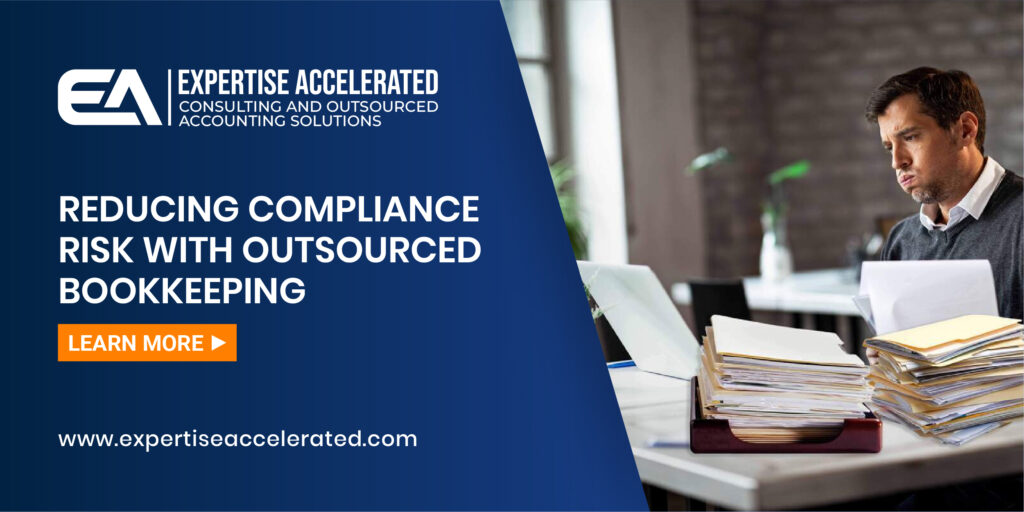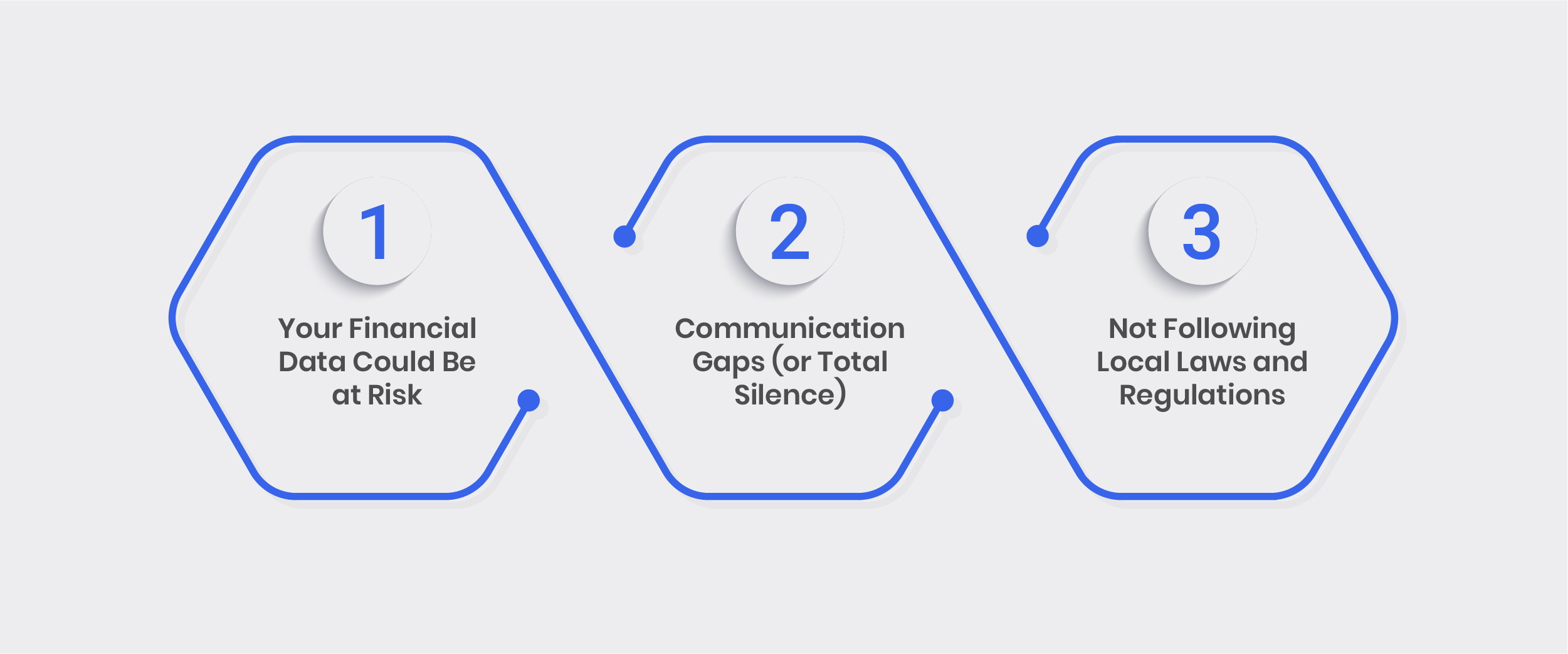Following accounting rules is very important for any business. Outsourced accounting and bookkeeping services help you avoid fines, gain trust from investors, and keep a good reputation. But these rules can be hard to follow because they change a lot and are different for each industry.
Many small businesses choose to outsource their accounting work because it saves time and money. A study by Clutch showed that 37% of small businesses in the U.S. outsourced at least one task, and accounting was the most popular. Outsourcing has become even more common since remote work became normal after the pandemic. But while outsourcing has many benefits, it can also bring some risks that are not always clear at first.
This blog will explain the main risks of outsourcing accounting and give tips to help protect your business.
Partnering with Expertise Accelerated helps you stay compliant and focus on growing your business.
An Overview of Compliance
Cybersecurity in 2025 is more complex than ever. Rising cyber threats and privacy laws need better data protection. By 2025, privacy laws will cover 75% of people, pushing firms to boost compliance. New threats like supply chain attacks, AI misuse, and quantum tech need urgent action. Hackers use AI; quantum computing risks encryption businesses must act now. Privacy laws like GDPR and U.S. state rules create legal complexity. Companies need smart, flexible compliance to avoid fines and build trust. Organizations must act early, linking security to business goals.
According to Forbes, Many businesses use SaaS for payroll and IT, but outsourcing doesn’t remove risk. Your company is still responsible for security and compliance. SOC reports help check how well providers manage risks. SOC 1 focuses on financial controls, SOC 2 on IT security. The best is SOC 1 Type 2, which looks at controls over time. A report isn’t enough to review it, understand it, and know your duties. If issues appear, take extra steps to protect your data. Always have a backup plan in case the provider fails. Since SOC reports can be complex, working with experts is helpful. In short, using SaaS means staying involved to keep your business safe and compliant.
According to Bloomberg, Banks used to manage risk by using software installed on their own computers. Now, many banks are switching to cloud-based software called SaaS. This means other companies manage the software, making it easier and cheaper for banks. Using SaaS helps banks save money because it includes many costs like updates and support. It also means banks need fewer staff to run the software. Many banks still use old systems, but new ones prefer SaaS for speed and lower costs. Banks are starting to see that using cloud software is a better way to manage risks today and in the future.
According to Harvard, Wells Fargo had millions of fake accounts. Volkswagen lied about how clean their cars were. Petrobras bribed officials, harming Brazil’s government and economy. These big stories made the news, but many other fraud cases didn’t. Almost half of all fraud is never reported, and companies lose about $3 million each year because of it. A survey found that many business leaders think it’s okay to be dishonest to reach money goals. This shows that cheating still happens a lot in businesses today.
Benefits of Outsourced accounting and bookkeeping services for Compliance
Expertise Accelerated links you to skilled accountants trained in U.S. financial rules. They keep your books accurate, taxes correct, and business compliant.
Outsourced accounting services offer:
- Expert guidance on federal, state, and local financial regulations.
- Accurate financial reporting using proven tools and methods.
- Strong internal controls to catch errors and prevent fraud.
- Clear documentation for outsourced audits and inspections.
- Modern accounting technology to automate tasks and improve security.
- Regular compliance bookkeeping checks to catch and fix issues early.
- Specialized tax knowledge to avoid penalties and optimize savings.
- Data protection plans to keep your financial info safe.
- Disaster recovery systems that protect your data and keep you compliant.
- Ongoing updates so your financial practices stay in line with new laws.
Top Risks of Outsourced Accounting
1. Your Financial Data Could Be at Risk
The main risk is sharing sensitive data with outside providers. A 2021 Statista survey found that 71% of U.S. businesses collect customer data. That’s a lot of information you’re handing over. If the wrong person accesses it, serious fraud or data theft can happen. Sadly, scammers know how popular outsourcing has become. Some may offer services that seem too good to be true, to get access to your data. Data security must be your top concern with outsourced accounting.
2. Communication Gaps (or Total Silence)
Outsourced accountants often work remotely, even from other countries. This distance can cause communication problems. You may not be able to check on their progress or ensure they’re following your exact instructions. In worst-case scenarios, you could experience “radio silence.” That means your accountant goes completely quiet, no emails, no updates. This can happen if systems fail or disasters cut communication. Some outsourced firms operate from countries with less reliable infrastructure. Ask about their backup and communication plans first.
3. Not Following Local Laws and Regulations
Outsourced teams may not know your state’s specific laws. Each state has different tax rules. If your accountant misses details, you could face legal trouble and fines. Compliance issues can harm your reputation or shut down your business. So while outsourcing might save you money, legal trouble can cost you much more in the long run.
How to Reduce the Risks of Outsourced Accounting
Do Your Homework
The best way to avoid problems is by doing careful research. Check the background of any accounting firm before you work with them. Ask for references and check with past clients. Also, request official documents like business licenses or certifications. This shows that the company is legitimate and trustworthy. Read “5 Questions to Ask Accounting Firms Before Hiring” by Expertise Accelerated. It includes helpful questions you can ask during your research.
Set Clear Communication Rules
Talk clearly and agree on goals to make outsourcing work. Check in often to stay on track. Ask the firm how they handle emergencies or disruptions. Do they have a plan to stay in touch if something goes wrong? Make sure they have reliable tools and systems to keep communication flowing.
Get It All in Writing
Once you’ve chosen an accounting partner, put everything in writing. A legal contract protects your business and holds the other party accountable. It should list services, deadlines, security, and penalties clearly. A strong contract prevents issues and protects you from fraud or bad service.
How to Stay Compliant with Accounting Rules
To follow financial rules, start by learning the important laws and keep up with any changes. Make sure your financial reports are correct by checking them often. Keep good records to show you are honest. Hire accounting experts to help you stay on track. Use systems to watch spending and stop mistakes or fraud. Use modern software to help manage money and follow rules easily. Teach your team about the rules and update their knowledge. Also, check for problems often so you can fix them before they get worse.
Final Thoughts
Outsourced Accounting and Bookkeeping Services help you follow rules and work with more efficiency. They provide expert help, accurate reporting, and peace of mind.
Expertise Accelerated connects businesses with skilled Latin American accountants who know U.S. laws. Led by CPA Haroon Jafree, EA provides remote accountants who work as part of your team. They offer direct communication, support, and secure data handling. They help U.S. businesses manage finances confidently, stay compliant, and save costs. Want to know more? Book a free consultation with Mr. Haroon today to build a strong, compliant financial team.




